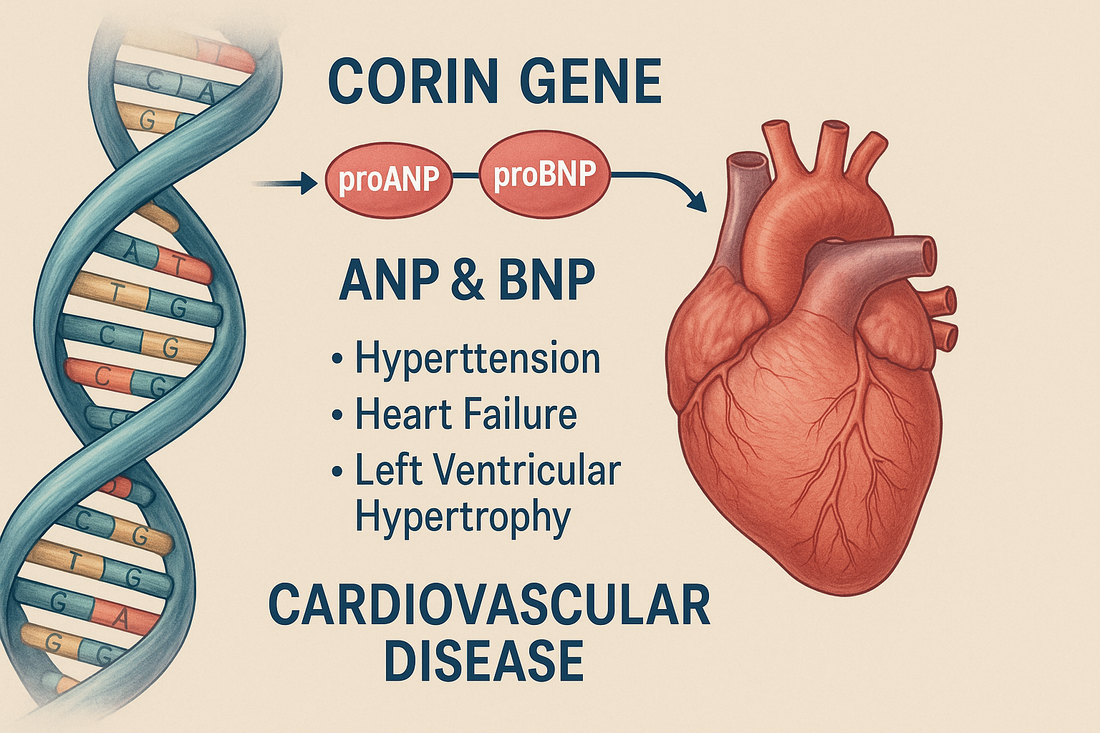Corin Gene Variants and Cardiovascular Disease
Introduction
The Corin gene, located on chromosome 4p12, encodes a cardiac serine protease that activates atrial natriuretic peptide (ANP) and brain natriuretic peptide (BNP). These peptides are critical for blood pressure regulation, sodium balance, and vascular health.
Variants in Corin can impair natriuretic peptide activation, leading to hypertension, heart failure, and increased cardiovascular disease (CVD) risk. CardiaX testing includes Corin to help identify patients who may benefit from personalized prevention and treatment strategies.
Corin Function in the Body
-
Activation of ANP & BNP: Corin cleaves pro-ANP and pro-BNP into active peptides.
-
Blood pressure regulation: ANP and BNP promote vasodilation and natriuresis (sodium excretion), lowering BP.
-
Anti-hypertrophic effects: Protects against cardiac remodeling and left ventricular hypertrophy.
-
Cardiorenal health: Supports kidney filtration and fluid balance.
Key Corin Variants
rs2271036 and rs3749585
-
Found more frequently in individuals with hypertension and heart failure.
-
Associated with reduced corin activity and impaired natriuretic peptide processing.
Corin p.I555(P568) and p.Q568(P581)
-
More common in individuals of African descent.
-
Linked with salt-sensitive hypertension and left ventricular hypertrophy.
How Corin Variants Contribute to Cardiovascular Risk
-
Hypertension – Impaired ANP/BNP activation increases vascular resistance and sodium retention.
-
Heart failure – Reduced natriuretic peptide activity weakens compensatory mechanisms against fluid overload.
-
Left ventricular hypertrophy – Chronic pressure overload from hypertension drives maladaptive remodeling.
-
Renal dysfunction – Impaired sodium excretion accelerates cardiorenal syndrome.
What Worsens Risk in Corin Variants?
-
High salt intake: Strongly exacerbates hypertension in carriers.
-
Obesity & insulin resistance: Increase BP and blunt natriuretic peptide signaling.
-
Sedentary lifestyle: Reduces cardiovascular and renal resilience.
-
Smoking & alcohol overuse: Promote vascular stiffness and oxidative stress.
How to Mitigate Corin-Associated Risk
1. Lifestyle Strategies
-
Diet:
-
Limit sodium intake to <1,500 mg/day for salt-sensitive carriers.
-
Follow the DASH or Mediterranean diet, rich in potassium, magnesium, and antioxidants.
-
Increase water intake for healthy volume regulation.
-
-
Exercise: Regular aerobic and resistance training lowers BP and improves vascular compliance.
-
Weight management: Reducing visceral fat decreases hypertension risk.
2. Nutraceuticals
-
Omega 1300 — Omega 1300: Lowers inflammation and supports vascular elasticity.
-
CoQ10 Omega — CoQ10 Omega: Improves mitochondrial function and heart muscle efficiency.
-
Magnesium glycinate: Supports vascular relaxation and natriuresis.
-
Potassium citrate: Helps balance sodium and lowers BP.
-
Curcumin Complex — Curcumin Complex: Reduces oxidative stress and inflammation.
3. Peptides
-
BPC-157: Aids vascular and cardiac repair.
-
MOTS-c: Enhances metabolic and mitochondrial resilience.
-
KPV: Mitigates vascular inflammation.
4. Medications
-
Diuretics: Particularly thiazides, effective in salt-sensitive hypertension.
-
ACE inhibitors/ARBs: Reduce BP and prevent cardiac remodeling.
-
ARNIs (angiotensin receptor–neprilysin inhibitors): Enhance natriuretic peptide activity, particularly useful in heart failure.
-
Beta-blockers: For patients with hypertensive heart disease or arrhythmias.
Case Example
A 50-year-old African American female with Corin p.I555 and p.Q568 variants presents with uncontrolled hypertension despite moderate lifestyle adjustments.
Plan:
-
Lifestyle: Strict sodium restriction, weight reduction program, structured exercise.
-
Supplements: Omega 1300, CoQ10 Omega, magnesium.
-
Peptides: BPC-157 for vascular health, MOTS-c for improved metabolic control.
-
Medications: Low-dose thiazide diuretic plus ARB.
Outcome: After 4 months, BP dropped from 160/96 to 130/82, echocardiogram showed reduction in LV hypertrophy progression.
The Bottom Line
The Corin gene plays a vital role in natriuretic peptide activation, blood pressure regulation, and cardiac protection. Variants can impair sodium handling and vascular function, predisposing carriers to hypertension, LV hypertrophy, and heart failure.
Through CardiaX testing, clinicians can identify Corin variants and tailor interventions involving diet, supplements, peptides, and medications to mitigate CVD risk.
References
-
Dries DL, et al. Corin gene variants, hypertension, and heart disease. Circulation. 2005.
-
Rame JE, et al. Genetic variation in Corin and cardiovascular disease. Hypertension. 2007.
-
Wu C, et al. Corin gene variants, salt-sensitive hypertension, and left ventricular hypertrophy. Nat Genet. 2009.
-
Chen S, et al. Corin and natriuretic peptide processing in cardiovascular health and disease. Trends Cardiovasc Med. 2018.


